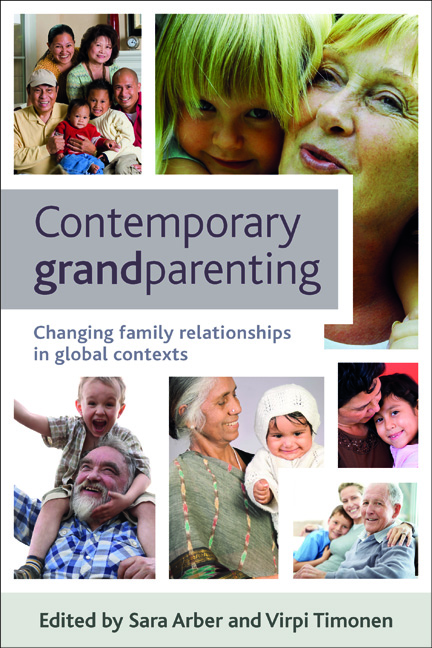seven - Being there yet not interfering: the paradoxes of grandparenting
Published online by Cambridge University Press: 01 September 2022
Summary
Introduction
‘You can send them [grandchildren] home when you’ve had enough, but sometimes you don't want to.’ (Mrs Wilkinson, grandmother, 74)
Grandparenting is an increasingly common experience (Mann, 2007), and it is also an ambivalent one for many grandparents, as Mrs Wilkinson (pseudonym) indicates. She hints at the pleasures of grandparenting, including a relative freedom from the kinds of responsibilities that parents have for children, but she betrays a sense of regret that she lacks control over the relationship – sometimes ‘you don't want to’ send them home, but, she implies, you must. She also speaks of grandparenting using a form of ‘normative talk’ that she expects will be familiar to the listener.
This chapter focuses on ‘normative talk’ about grandparenting. It is based on analysis of 46 interviews conducted with grandparents in the UK, from which we have identified two main cultural norms of grandparenting. There were very high levels of consensus in the study over what grandparents ‘should’ do, namely ‘not interfere’ and ‘be there’. We explore how these two cultural norms concerning grandparenting resonate in contemporary accounts of what grandparenting is and how it ‘should be done’.
We also argue that these ‘grandparenting norms’ conflict with others that are significant for contemporary grandparents, specifically norms about good parenting, and about the moral value of independence and self-determination. The grandparents interviewed for this study had a keen sense that being a ‘good parent’ (to their own adult children) should mean allowing them to be independent and thereby ‘not interfering’, but this could sometimes conflict with their sense of responsibility to their grandchildren. In addition, the character and quantity of ‘being there’ that was required of grandparents was often determined not by themselves but by their children. This was in clear contradiction with the grandparents’ sense that they should be allowed to be independent as well.
- Type
- Chapter
- Information
- Contemporary GrandparentingChanging Family Relationships in Global Contexts, pp. 139 - 158Publisher: Bristol University PressPrint publication year: 2012

